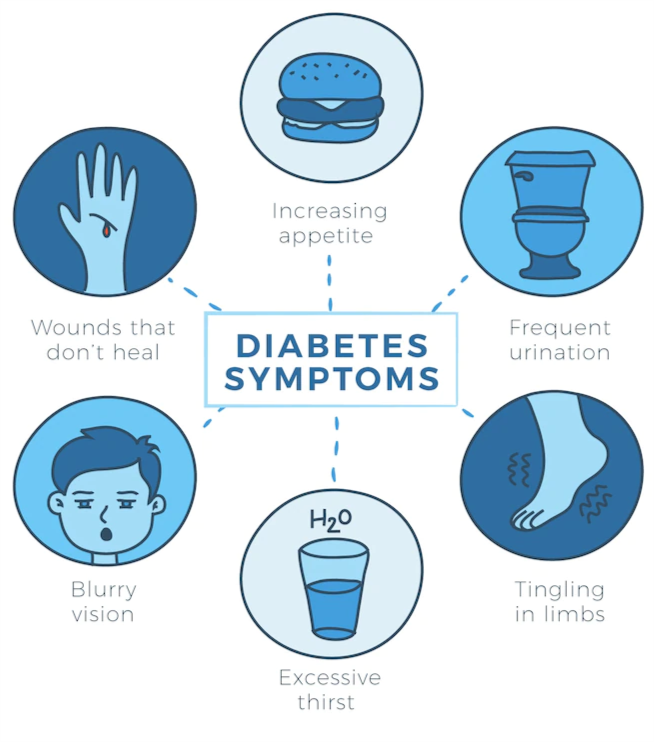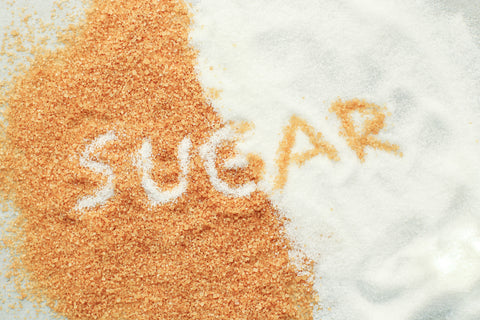Diabetes impairs your body's ability to process glucose. Insulin moves glucose from the blood, into the cells, for energy. When your body can no longer produce enough insulin or doesn’t respond to insulin, you develop diabetes (9).
Insulin is a hormone, which is secreted by the pancreas into the bloodstream, moving blood sugar into the cells and lowering the amount of sugar in the bloodstream. As the blood sugar levels drop, the pancreas slowly stops producing insulin.
The liver stores excess glucose and when our glucose levels are low, the liver’s store is used.
Symptoms of Type One Diabetes and Type Two Diabetes
- Feeling thirsty
- Frequent urination
- Unexplained weight loss
- Presence of ketones within the urine
- Fatigue and weakness
- Irritability
- Blurry vision
- Slow-healing wounds
- Frequent infections

Cause of Diabetes
Family history (genetics), environmental factors, race/ethnicity and weight all play a role in the development of diabetes.
Long Term Complications
Diabetes can lead to many other health problems such as cardiovascular diseases, nerve damage, nausea/vomiting, diarrhoea/constipation, kidney damage, problems with vision, foot damage, skin and mouth conditions, hearing impairment, Alzheimer's disease and even depression (2).
High Blood Sugar
High blood glucose or hyperglycaemia is when you check your blood sugar and have a fasting blood sugar higher than 7.0 mmol/L or postprandial blood sugar (after eating a meal) higher than 11.0 mmol/L.
Your target range is between 4.4-7.2mmol/L.
How To Bring Down Your Blood Sugar Level Immediately
If this occurs, you should administer fast-acting insulin. Exercise is also effective in bringing down high blood sugar, but if there at ketones present within the urine (determined by test strips) do not exercise, as it will raise your glucose levels even higher.
Your doctor will inform you how much fast acting insulin to administer, depending on how high your blood sugar is. Monitor your blood glucose level and after 15-30 minutes check if it has come down and make sure it is not too low.
If you have very high sugar levels (diabetic ketoacidosis) and experience the following symptoms, go to your local A and E; Shortness of breath, nausea and vomiting, ketones in your urine, confusion, stomach pain and very dry mouth.
If you have frequent high blood sugar readings, you should see your doctor (11).
Causes of Hyperglycaemia
- Not enough insulin
- There are different types of insulin, so you may have enough insulin, but it's not effective
- You ate more than usual
- Lack of physical activity
- Your stress levels are high
- You have had a surge of hormones (usually around dawn) (10)
Prevention
- Eat a healthy diet consisting of fresh fruits and vegetables and high fibre foods
Such as beans, legumes, nuts, seeds, fish, whole grains, leafy greens, berries, vegetable sources of protein, healthy fats (avocado and olive oil), low fat dairy products and herbal teas
Avoid sugary drinks, ultra-processed foods (with added sugar and sodium), fast foods, fried foods, butter, saturated fats, full-fat dairy products and processed meats (8)
- Eat foods with a low glycaemic index
This includes whole grain bread, breakfast cereals, apples, strawberries, peaches, carrots, broccoli, cauliflower, sweet potatoes, corn, lentils, chickpeas, kidney beans, noodles, brown rice, quinoa and buckwheat. Always choose healthy snacks over sugary ones.
- Manage your carbohydrate intake
- Control your portions
- Stay hydrated (12)
- Lose weight and maintain a healthy weight (2)
- Regular exercise, to see the full benefits of exercise
- Try to manage stress levels by removing things that cause stress or try meditation
- Get a good night's sleep
- Always monitor your blood sugar levels closely (12)
Supplements for Diabetes Care
- Chromium contributes to the maintenance of normal blood glucose levels and normal macronutrient metabolism (carbohydrates, fats and proteins).
Chromium helps insulin attach to cell receptors to encourage uptake into the cell. Chromium deficiency, which is common, contributes to insulin resistance (1).
Chromium rich foods include meats, whole grain products, fruits, vegetables and nuts (12).
- Alpha Lipoic Acid helps improve insulin sensitivity by protecting the neurons involved in hormone production. It can also be used to relieve nerve damage, cardiovascular problems, problems with vision and pain and swelling (7).
It increases glutathione production which protects pancreatic cells from damage.
- Vitamin D deficiency contributes to insulin resistance. It is thought that vitamin D lowers the risk of developing diabetes and supresses inflammation of pancreas cells.
Furthermore, vitamin D receptors in the brain have been linked to glucose levels and body weight maintenance (1).
Vitamin D has many other health benefits and should always be taken with Magnesium as without magnesium, Vitamin D remains inactive.
- One study concluded that a higher Magnesium intake was associated with lower fasting glucose and insulin (6)
- A good Vitamin B Complex is beneficial as Vitamin B12 helps prevent diabetic neuropathy and metformin can amplify deficiency of B12.
Vitamin B7 is involved in normal macronutrient metabolism. Vitamin B6 helps regulate the release of stored glucose. Vitamin B3 preserves beta-cell function and assists in insulin binding (1). B vitamins contribute to normal energy levels and a reduction in tiredness and fatigue.
- Research found that there is a significant association between Nigella Sativa (Black Seed Oil) supplementation and a reduction in fasting plasma glucose (4).
- Curcumin (the main component of Turmeric) is effective at lowering blood sugar by modifying the metabolism of glucose (9).
- Another study found CoQ-10 can reduce blood glucose levels in patients with and without high blood glucose levels (5).
- Probiotic bacteria can be beneficial in preventing insulin resistance. Supplementation with probiotics helped normalise insulin functioning and blood glucose levels.
- Vitamin C has been shown to be beneficial in lowering fasting and post-meal glucose levels.
- Zinc is needed for the synthesis, storage and secretion of insulin. Zinc, like vitamin D, alpha lipoic acid and biotin, play an important role in type 1 diabetes, as it protects certain cells from damage and promotes normal function of the immune system.
In addition, probiotic supplements have been proven to have positive effects on heart disease and metabolic disorder parameters in patients with type 2 diabetes.
Any information or product suggested on this website is not intended to diagnose, treat, cure, or prevent any medical condition. Never disregard medical advice or delay in seeking it because of something you have read on this website. Consult your primary healthcare physician before using any supplements or making any changes to your regime.
Related Articles
- Diabetes (Insulin Resistance) Significantly Increases Risk of Alzheimer’s Disease! | HealthAid
- How to Maintain Normal Blood Sugar (Glucose) Levels? | HealthAid
- Health Benefits Of Chromium | HealthAid
References
- How to Maintain Normal Blood Sugar (Glucose) Levels and Reverse Type 2 Diabetes? – FULL HEALTH SECRETS
- Diabetes - Symptoms and causes - Mayo Clinic
- Glycaemic management in diabetes: old and new approaches - PubMed (nih.gov)
- Effect of Nigella sativa black seed supplementation on glycemic (greenmedinfo.com)
- A meta-analysis of randomized and placebo-controlled clinical trials (greenmedinfo.com)
- Higher magnesium intake is associated with lower fasting glucose and (greenmedinfo.com)
- Alpha Lipoic Acid Benefits, Sources, Dosage and Side Effects - Dr. Axe (draxe.com)
- Study: Nutritious Diet May Reduce Diabetes Risk - Dr. Axe (draxe.com)
- Turmeric Tea Benefits, Uses, Recipes, Side Effects, More - Dr. Axe (draxe.com)
- Hyperglycemia (High Blood Glucose) | ADA (diabetes.org)
- How to Lower Blood Sugar Quickly in an Emergency: Tips and More (healthline.com)
- 14 Easy Ways to Lower Blood Sugar Levels Naturally (healthline.com)
- Images: Image by Racool_studio on Freepik





